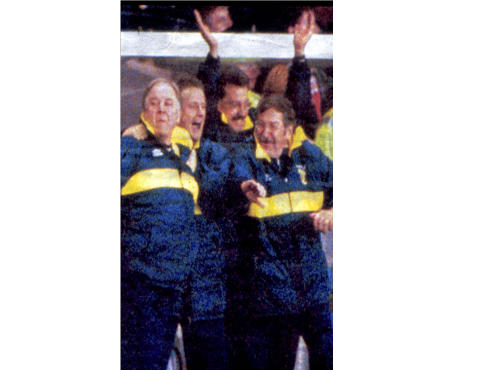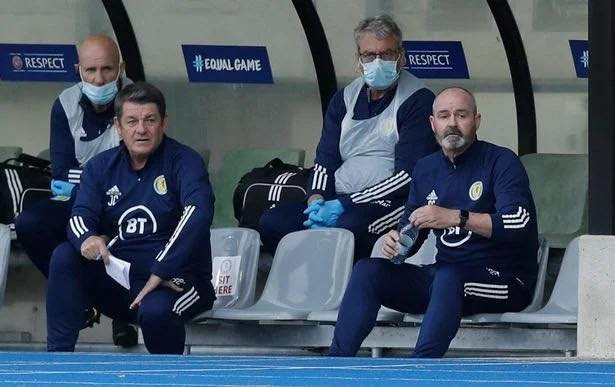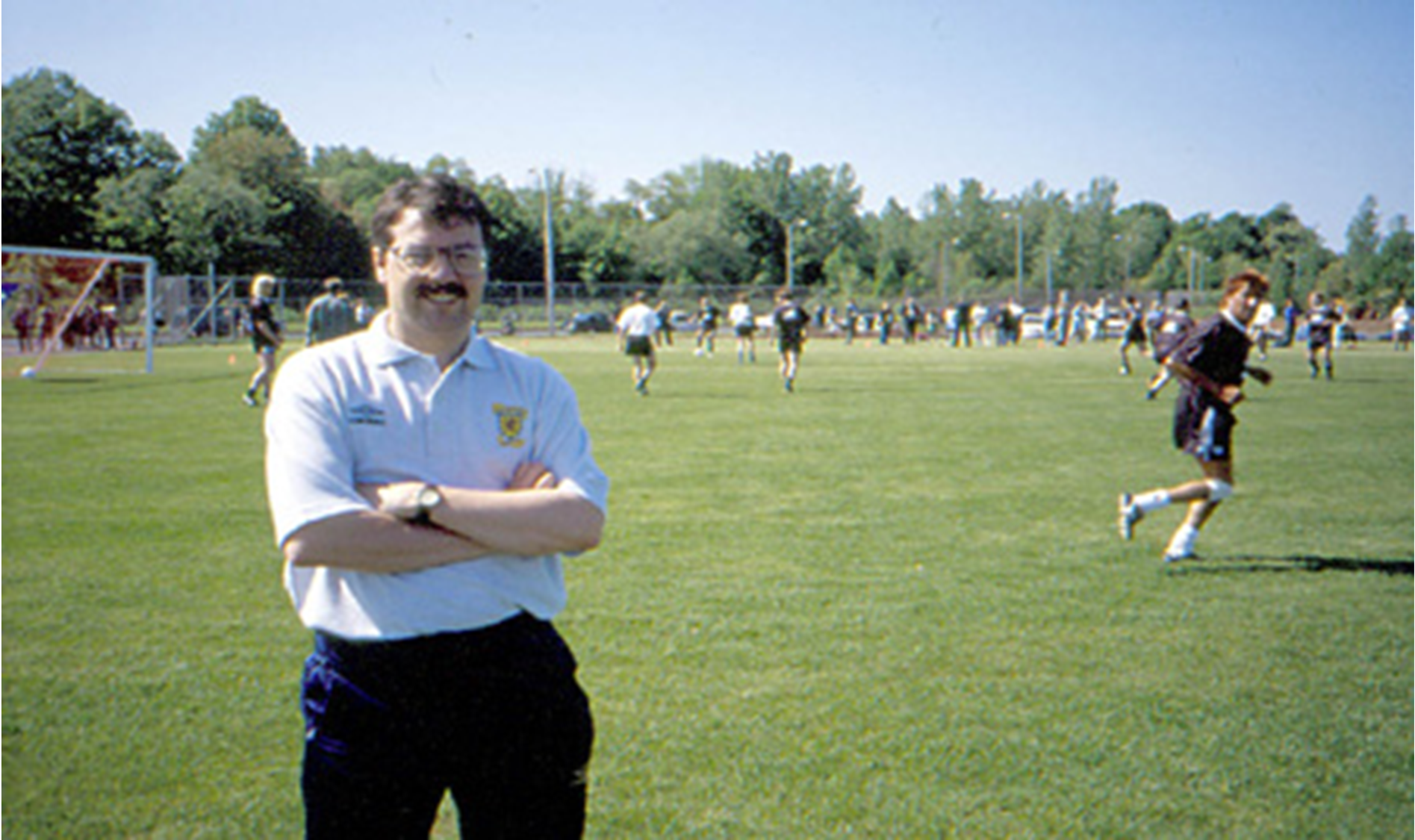John MacLean The Scotland Doctor - 30 Years In The Game
Last updated: 9.37pm, Thursday 16th December 2021
As the Clinics Chief Executive, Dr John MacLean is responsible for the overall running of the Clinic as well as seeing clients for sports medicine related consultations, including steroid injections. Until a few weeks ago, John was also Team Doctor for Men's National squad and had been for the best part of three decades.
On Monday November 15th John decided to hang up his football medical kit bag, and the victory over Denmark really was a special night to end on. A result, a team and a lifetime of memories that he will never, ever forget.
Dr John MacLean has been part of the medical team for over 30 years having first worked for the Scottish FA in 1983. His involvement with the Senior team began at Euro '96. He quietly served nine permanent Scotland managers and earned the admiration and respect of them all.
“In the summer it was 25 years with the big team,” he said. “It’s a combination of things. It’s probably recognising when is a good time to stop.
“The last year and 18 months has been really difficult. It’s been busy, it’s been hard, and I’ve spent an awful lot of time in the last 18 months on all things COVID related to football and then disappearing off with the team for ten days at a time threeor four times in a year was a lot. There was no watershed moment, just a feeling that it’s a good time to step back. And it’s a nice time point with the end of the qualifiers and fingers crossed they all go well and I can go out on a high. I’m up at 229 games now so it’s a fair shift.”
A "fair shift" is what some people say after a long day in the office, but after 30 years of touring etc - we think that John has earned his rest. Hopefully there will be a return visit as a guest of honour in the stand in Spring 2022 to see the National Team Qualify for the World Cup in Qatar.
We caught up with John over a coffee and Belgian bun from Greggs, after the dust had settled on his final match. It was great to hear how it all came about and how he's looking forward to "Going to Qatar World Cup, this time as a member of the Tartan Army"...
What generated your interest in medicine, then sports medicine?
"I seem to have wanted to be a doctor for as long as I can remember. When I was very young I got a toy guitar for Christmas and remember having it with me on a rare visit to the doctor. When he asked what I wanted to be when I grew up I told him "a doctor or a guitar player"! He quickly advised me on a musical career but despite this, I planned for being a doctor. I grew up in an area of deprivation in Glasgow but in a very well cared for the family environment. My grandmother was a community activist who spent her life helping others so I was raised in an environment where helping those who were less able was the norm and for me being a doctor meant I could do just that. Interestingly when I qualified as a GP, I joined a practice in Maryhill in Glasgow very close to where I was brought up and stayed there for 32 years and loved (almost!) every minute of my time there."
You've been involved as the team doctor and medical advisor for 3 decades, how did that come about? As well as being a GP, you’ve ended up with a prosperous career in sports medicine. Can you tell us a bit about that?
"My older brother, Graham, played professional football and my dad and I would travel to watch him every week including when he represented Scotland as a youth international. This allowed me access to the players area after the games, and I loved this time. Having realised that my football ability would never get me into this environment, I decided I would have to get there through another route!
When I first qualified as a doctor in 1981, I worked in Glasgow Royal Infirmary and met the man who would become my boss, mentor and friend – the late Professor Stewart Hillis who became the Scotland team doctor in 1982. He knew of my interest in football – he says I introduced myself saying…. "Hi my name is John MacLean and I want your job with Scotland!!" It wasn't true but it did work out that way.
The Scotland youth team won the European Championships and went to Mexico for the World Cup and following this Stewart asked if I would like to go on the next trip to Leningrad for the next European finals – he said it was for one trip only but 38 years later I am still working with the Scottish FA!
I owe everything I have done in football and Sports Medicine to Stewart. He was my friend and mentor and since he died in 2014, I still miss him every day. My father died when I was in my 20s so Stewart was the person I turned to for advice and support and we developed a fantastic bond of friendship which included our families to this day.
I started with the youth teams and worked with them for 13 years including the Under 16 team who reached the World Cup Final at Hampden in 1989 and the Under 20 team who reached the quarter-finals of the World Cup in Chile in 1986. By this time I had met Craig Brown who was my club manager at Clyde and was Assistant to Andy Roxburgh with the Scotland National Team – another massive influence in my life and a friend to this day. It was Craig and Stewart who were influential in me getting “promoted” to the Men's A team in advance of the EURO 96 championships working as the second doctor with Stewart – and 25 years later I am stepping back after a fantastic career in football.

As the team doctor currently, what does your job entail? What are your duties there?
The job starts before the squad is announced in monitoring the fitness of the players who are likely to be selected and those who may be called up later. Initially, I would do this myself, liaising with club medical staff but this is now largely done by my colleague, Graeme Jones, Head of High Performance at the Scottish FA. When the players arrive in camp it is usually the day after playing for their clubs so, together with the team physiotherapists, we assess the fitness of the players and update the coach.
For some, we determine that it is unlikely that they will recover in time to play and we return them to their club for further assessment and treatment. We have developed a great relationship with club medical staff who trust us to act in the players best interests and we never play players if doing so would worsen their injury – we are aware we are just 'borrowing them' for the time of the games. During the camp my job is working with the physios and injured players, dealing with any illness in camp and other duties such as anti-doping matters and testing and, in the last 18 months dealing with COVID – trying to reduce risk of infection, overseeing the multiple tests required and planning such as bus and plane travel to minimise the risk of players being identified as a close contact.
On matchday, I go on the field with one of the physios to assess any injuries and decide on their immediate management. We have a second doctor on matchdays – Dr Jonny Gordon who is an experienced Emergency Medicine Consultant who is responsible for liaison with the local ambulance and first aid staff especially when we are abroad. Jonny is also responsible for our ongoing training of the medical team for any trauma or a medical emergency which may occur during the game.

So, would treatment for a top-level football player differ from a weekend warrior or a school ages athlete with a similar injury? And what differences might there be?
The assessment and treatment of an injury is the same no matter the player. What is different is the experience of the medical team, the access to investigations such as MRI scanning and the “importance” of getting the diagnosis and ongoing management right as for professional athletes being able to compete in what they do for a living. We have excellent and experienced staff working with Scottish National teams and have an excellent relationship with our coaches and colleagues at the player's clubs.
As well as lots of work trips to exotic or not so locations across the globe - with the world-famous scenery on our doorstep - can you tell us of three nice spots in Scotland that you will like to visit when you’re no longer touring with the team?
I was planning to travel the North Coast 500 with my son on a road trip before COVID so that is definitely number 1 on my list. I’ve never been to Mull which is the ancestral home of the MacLeans so a visit to castle Duart and over to Iona would be great.
If you could go for dinner with two famous Footballers dead or alive, who would you go with, and where would you go?
I’ll cheat a bit and go for 2 former players but who are more famous as managers – Sir Alex Ferguson and the late Walter Smith. I was very fortunate to spend time with Walter when he was Scotland manager and loved being in his company of an evening after the days work had been done. As to a venue – it would have to be my house so the evening could extend into the early hours and so my great friend and mentor the late Prof Stewart Hillis, who was a close friend of both could be there as well.

Your last two games as the team doctor turned out to be two important and memorable victories as part of the recent and rate lengthily unbeaten run for the national team. What did those games mean to you?
The final week was one of the most enjoyable of my time with Scotland. From a practical point of view, while there were a few medical and injury issues, the medical team were able to manage them appropriately early in the week, so the manager knew who was available to play in advance of the 2 matches. Furthermore, the squad's vaccination status meant less COVID testing and less hassle with travel so fewer issues for me to deal with.
The group have a great relationship, both players and staff so it was an emotional evening the night before the Denmark match when the players and then staff gave me a lovely presentation to mark my time with the team.
Finally, do you have any tips or messages for whoever has the hard task of filling your boots as the National Team doctor?
As I did with Prof Hillis during my early years with the team, Dr Jonny Gordon has been with me over the last 11 years both at the home matches and travelling to away games, so he is more than capable of carrying on the work we have done together. In addition, all colleagues from physios, sports scientists, analyists and the coaching staff make it such a great place to work that the transition will hardly be noticed.

Are Scotland going to make it to the finals in Qatar in December 2022?
We have put ourselves in a great position especially with a home semi-final where I would back Scotland against any team – especially with the noise and passion of a full Hampden. If we win that match we could do with a bit of good fortune – but the way we are playing would leave me feeling confident that I could be supporting the team in Qatar next year. Having been in France for the 98 World Cup it would be fantastic to be at another but this time as a member of the Tartan Army...
Over the past few week's we've gathered some memories and have been sent some nice messages and stories from people who have been part of the past 30+ years of which John’s been involved in the National Squad.
It's fair to say "The Doc" will be greatly missed behind the scenes!
[Graeme Jones - Scottish Football Association]
I first met John in 1998 at Glasgow University when I was doing the MSc in Sports Medicine. Since then John has signposted and guided me through my career. He has been an unbelievable mentor from whom I have learned so much from. We have enjoyed the occasional church visit together in the outposts of Europe, and way too many glasses of Cava at times! He is an amazing colleague who I am proud to say I have worked with, and a fantastic friend - The Grandfather of Sports Medicine in Scotland.
[Michael McBride, Physiotherapist]
It is hard to put into words the influence that John had has in the world of Sports Medicine in general but football in particular. He has been instrumental in so many vital initiatives from life support education through to groundbreaking research on Concussion. Working at the highest level with UEFA and FIFA John has positively impacted on the health of so many players. His last match on against Denmark was his 229th match - a landmark achievement believed to be a world record in football.
His contribution has simply been exceptional. I am incredibly fortunate to have worked and learned from the very very best - a true legend of the game and a fantastic friend and colleague. "
[Jonny Gordon, Scottish FA Men's New Team Doctor]
John MacLean is the man for whom every month is Movember. In the often juxtaposed worlds of football and medicine he traversed both effortlessly for over 30 years, with the health and wellbeing others always the primary consideration.
His dedication to his careers - for one job would just be too boring – has been so all-consuming that the trademark moustache cultivated decades ago in honour of his one true hero, the Tom Selleck of cardiology and ill-fitting Scotland trackies, Professor Stewart Hillis, is now back in fashion. Again.The Doc and his mouser have been reassuring presences around the national teams for decades but that reassurance, inevitably, extends beyond his remit. Personal counsel comes as standard: whether to provide words of wisdom, comfort, or to insist you undertake the VO2 Max text as part of your mid-life MOT. I am grateful to him for all of the above. Some more than others.
He has given his time selflessly to Scottish football, not least during COVID where days, nights, and weekends have been spent steering the game through a pandemic and (mostly) on the right side of public health and government guidelines.
Retirement is not an option for a man who sees his work as a public service and a pleasure. But if nothing else he now has no excuse for spending more time with Maureen - and seeing what lies beneath that mouser.
[Darryl Broadfoot, Head of Sport]
Not only has John been so very influential in the medical world he has continually practised what he preaches by maintaining an exceptional level of fitness for a man of his age. From sprint sessions up the hills in Newlands Park to the long runs on a Saturday morning through the Southside of Glasgow - John has worked hard to be the first to the injured player on the park and just as quick to the free bar and the buffet after the games
[Frank Gilroy, Physiotherapist & John's Personal Trainer]








